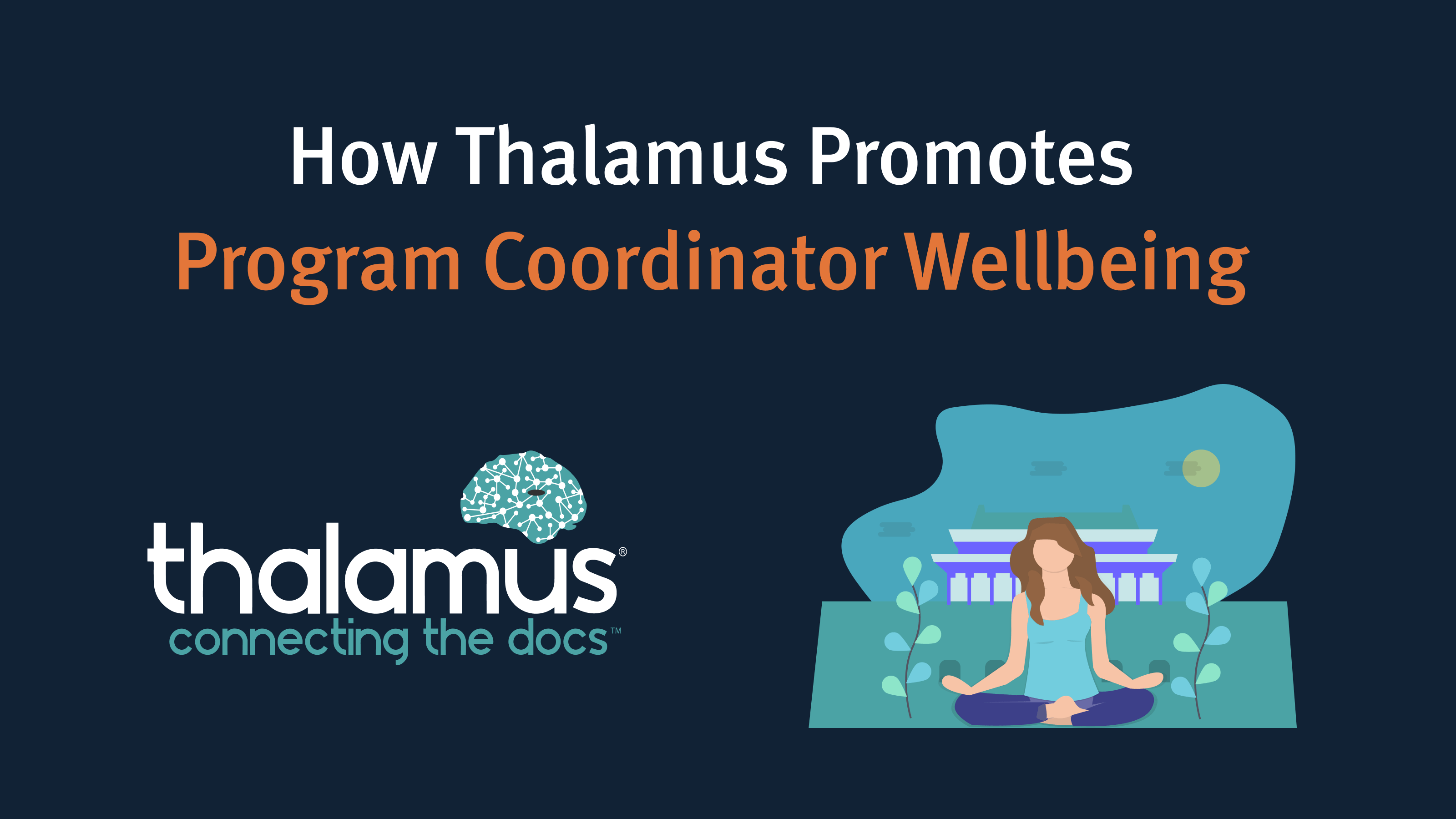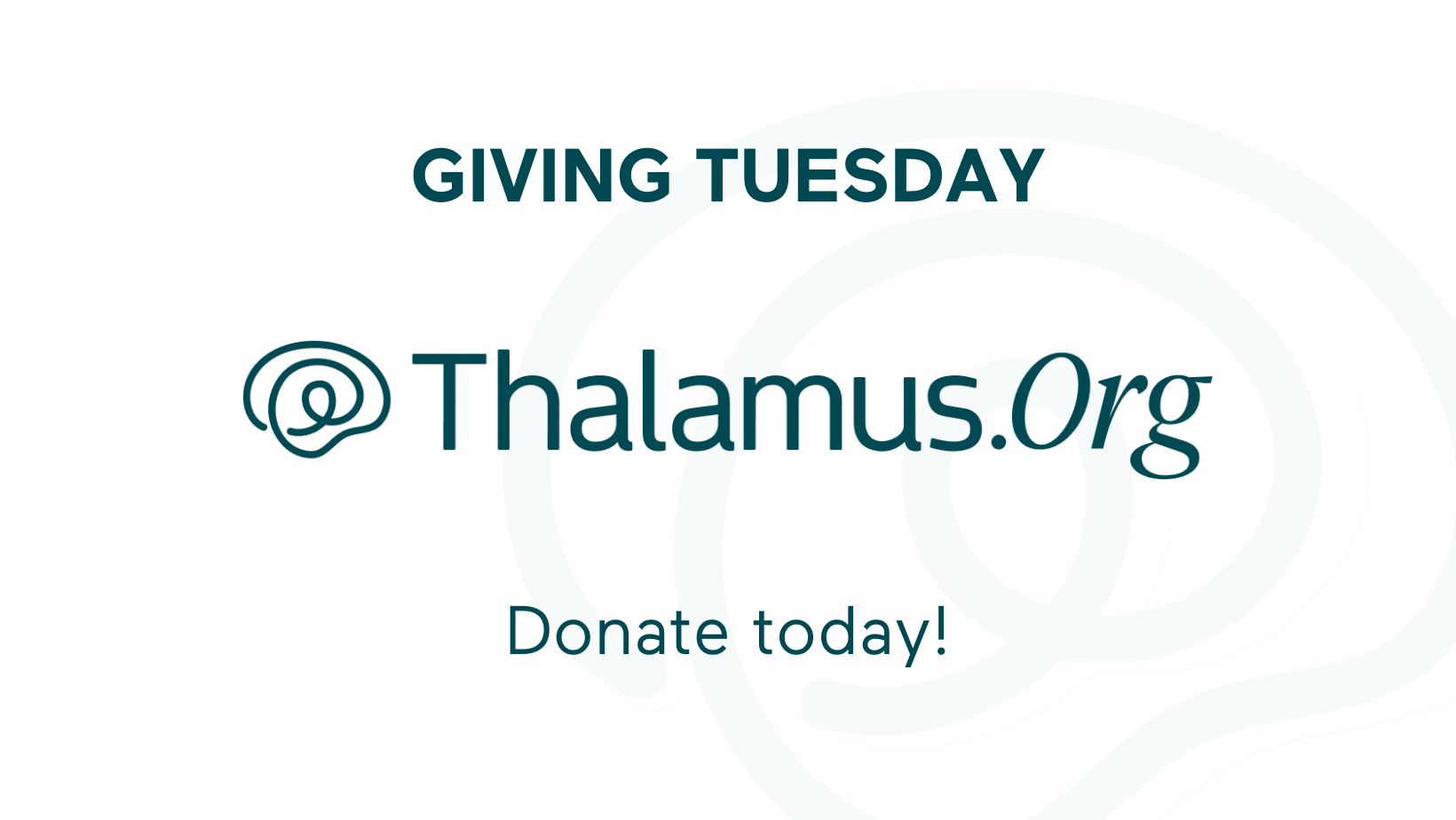How Thalamus Promotes Program Coordinator Job Satisfaction and Wellbeing

Program coordinators and administrators are the mainstay of Graduate Medical Education (GME). They are tasked with the monumental role of ensuring that residency and fellowship training programs run flawlessly. This not only includes resident and fellow recruitment, but also accreditation efforts, program evaluation, and supporting residents, fellows, and faculty.
When COVID-19 disrupted the GME recruitment cycle and forced a long-established in-person process to go virtual, it was program coordinators who led the transition and ensured its success. However, this has not been without its challenges. GME has experienced the cultural impact of The Great Resignation, where in the last year alone, 69 million Americans have left their jobs due to challenges with compensation, engagement and overall wellbeing. And program coordinators, along with clinicians and hospital administrators, were no exception. From 2021-2022, our analysis of ACGME ADS data shows there was over 30% program coordinator turnover in GME.
At Thalamus, we know that program coordinators and administrators are the unsung heroes of GME. And we have a passion for developing software that streamlines the GME recruitment process for all stakeholders, including applicants, program directors, GME leadership, and perhaps most importantly, program coordinators.
This week’s blog post is centered on program coordinator wellbeing. We start by defining the role of the program coordinator. We then review recent research and analysis on program coordinator workforce trends, including burnout and turnover. And then we provide the ways in which Thalamus supports program coordinators in optimizing their workflows and ultimately job satisfaction.
How is the role of a Program Coordinator Defined?
The Accreditation Council for Graduate Medical Education (ACGME) Common Program Requirements most recently updated in 2020, define the role of a program coordinator as follows:

The key item here is that the role of the program coordinator has evolved over time from a primarily support/administrative role to a “member of the leadership team (that) is critical to the success of the program.”
Recent Research and Analysis on Program Coordinator Workforce Trends:
Given the growth of the program coordinator role over the last decade, and the efforts of coordinator leadership throughout GME, there has been a recent developing body of research that focuses on program coordinator workforce. Interestingly, even prior to COVID-19, many of the challenges now seen as part of the great resignation, were already having an impact on the program coordinator workforce: burnout leading to decreased job satisfaction leading to increased turnover.
The increasing demands of the program coordinator role was first documented in 2003 in Academic Radiology, “The Role of the Residency Coordinator”, which called for reclassification of the coordinator position. The author provided an outline of responsibilities stating “As these duties imply, the rank of program coordinator is a managerial position, and should be clearly stated as such…”
The ACGME’s Next Accreditation System (NAS) was then implemented in 2013. This changed the program coordinator role even more drastically with new processes, multiple new committees (PEC and CCC), semi-annual Milestone reporting deadlines, self-studies, new evaluations, data analysis and semi and annual reporting requirements, which added to the job duties of program coordinators.
In 2017, The Journal of Surgical Education (JSE) published “The Perfect Storm Is on the Horizon!”, which summarized a survey of general surgery program coordinators (conducted in September/October 2016). Of the 153 individuals that completed the survey (of 254, 60% response rate), 76% of respondents reported significant burnout and 59% considered resigning from their position at least once in the prior 12 months. The paper notes that, “Participants consistently reported increasing responsibilities and expectations combined with declining or inadequate levels of support as sources of job stress.” The authors further warned that, “The resultant potential turnover in personnel and loss of collective knowledge may have devastating ramifications to program accreditation.”
Similarly, in 2018, a (2016) survey published in Pediatric Neurology of the specialty’s program coordinators, with a program coordinator response rate of 84%, found that: 58% of program coordinator respondents had clerical titles, 79% had no designated GME career path, 61% had little to no formal GME training, and 58% reported to a supervisor that lacked GME experience. Further, 69% had time allocation below ACGME recommendations and 68% had work-hours exceeding those scheduled. 54% of respondents reported communications after hours, of which 92% of the work was unpaid. Most notable was that the median job tenure was four years, with a 33% turnover rate amongst program coordinators in the specialty over the prior 12 months.
A 2019 study in the Journal of Graduate Medical Education (JGME), showed that coordinators that received training from peers, in addition to standard GME training yielded the best administrative outcomes. In 2020, related work in the International Journal of Medical Education and Journal of General Internal Medicine found associations in work engagement, job satisfaction and turnover intention. The latter included that burnout fluctuated throughout the academic year, with onboarding and recruitment months resulted in the highest levels of burnout, particularly in situations where coordinators felt isolated from their peers.
Another notable study in JGME (2019) quantified burnout amongst program coordinators by utilizing the Copenhagen Burnout Inventory (CBI). Those who had more years in graduate medical education or had a lack of wellness activities offered were more likely to consider leaving their positions. A response to this article by two of the authors from the pediatric neurology study further recommended, “Addressing the root causes of PC burnout and high turnover with possible solutions… What is needed are fundamental changes in the understanding of the managerial PC role by institution leadership and human resources departments followed by restructuring GME administration and PC job titles.”
How Thalamus Promotes Coordinator Wellbeing
Considering the above, one of the reasons Thalamus was created was to provide technology and data-driven solutions to optimize GME recruitment. Our software not only streamlines program coordinator workflows, but in doing so, provides coordinators with surplus time to focus on other core elements of their jobs.
In an annual end-of-season survey provided to program coordinators using Thalamus,
- 94% reported an enhanced personal touch with applicants,
- 95% saved significant time
- 84% reported decreased burnout
And 90% of program directors also reported both improved coordinator job satisfaction and more efficient program management.
Thalamus supports program coordinators as follows
Thalamus is built for the coordinator as the primary program user.
Thalamus is a two-sided platform that was built through a grassroot collaboration of program coordinators, program directors, and applicants/medical students to address the inefficiencies and high costs of GME interview management and scheduling. On the program side, the coordinator is generally the person who uses Thalamus the most and we’ve focused our efforts on designing products and features to meet coordinator-specific recruitment needs. We even have an entire page focused on solutions for program coordinators. Throughout the near decade long history of Thalamus we’ve received input from thousands of coordinators, including incorporating feedback from our program coordinator advisory board. And we’ve considered it our privilege to listen and learn, so that we can continue to innovate Thalamus to meet the needs of coordinators (and all GME stakeholders) regardless of geography, specialty, or other program characteristics.
Thalamus acts as a centralized source of records for all recruitment processes and metrics.
In addition to promoting job satisfaction amongst coordinators, Thalamus also serves as the comprehensive repository for recruitment data and collective knowledge. Our archive mode stores all data by season so that 1) programs can look back on prior recruitment years in terms of processes, practices, scoring methodology and more; and, 2) in the event that coordinators are out on leave or turn-over, match season can continue uninterrupted by allowing for easy access of all recruitment information, training and transition materials, and access to our customer care team of former expert program coordinators.

It’s what we like to refer to as the “Thalamus Advantage.” Not only does that include our comprehensive software, but also the comfort knowing that our team has your back. We are ready to assist in supporting any program through recruitment season, whether that is in getting a brand-new team member up to speed or helping a seasoned coordinator optimize elements of their process.
Thalamus provides the most streamlined virtual interview experience.
When GME interviews were pushed to go fully virtually because of COVID-19, Thalamus was there and ready to innovate. Our product team is always thinking about how to optimize program coordinator workflows and that is exactly what we did with Thalamus Video to support how GME and program coordinators manage interview days. Thus, while we do integrate with Zoom (and Teams and Webex), one of the reasons we built our own custom video interview solution was because a program coordinator’s time is much better spent than playing air traffic controller managing breakout rooms. And this is why Thalamus comes equipped with our master view to oversee/manage the interview day while allowing applicants and interviewers to navigate through the interview day on their own, and send a “virtual knock” when needed.

Thalamus manages data and eliminates manual processes.
Whether through Cortex saving coordinators and faculty up to 50% of application review time through a technology assisted holistic review, or Cerebellum, our analytics and data dashboard automatically calculating recruitment outcomes, including geography and DEI data. Thalamus consistently finds solutions for monotonous tasks to improve workflows, as well as provide data and analytics to drive optimal recruitment decisions. This is extended throughout every portion of Thalamus including applicant self-scheduling, report generation, automation of email messages, comprehensive rank lists, integrated surveys and much more. Thalamus handles the busy work so coordinators can focus on recruitment and other, more critical job tasks.

Thalamus provides support for program coordinators from and by a community of program coordinators.
80% of the Thalamus customer success team is staffed by former program coordinators (one of whom authored multiple articles listed above). We also have close relationships with our 15-member Program Coordinator Advisory Board (one of whom was also an author on a publication above), as well as thousands of program coordinator that use Thalamus. However, it’s not only the company we keep, but the events we organize including an annual Program Coordinator Appreciation Celebration (coinciding with the ACGME Conference), Community Forums on key topics in GME, community-based and advanced training seminars which count towards TAGME certification, and our Podcast, Thalamus Grand Rounds which celebrates program coordinators as the champions of GME.
In summary, the role of program coordinator has evolved to one that is mandated by ACGME for program requirements, directly calling out the coordinator as part of the program’s leadership team. Despite this, there is a large body of research analyzing limitations in program coordinator job satisfaction, which is increasing burnout and leading to accelerated turnover, and can be devastating to program accreditation and recruitment success. At Thalamus, our passion is to build technology solutions for all GME stakeholders, and importantly program coordinators, to streamline, centralize and optimize recruitment processes.
Thalamus increases coordinator job satisfaction and wellness, decreasing burnout and potentially limiting turnover overall. And when turnover does happen, Thalamus serves as the source of record to aid in training materials and supported by a team of experts (and former coordinators) to ensure a successful transition.
Want to learn more about how Thalamus can assist with your program or institution. Please contact us at sales@thalamusgme.com or request a free, no-obligation demo today.
Explore our latest insights and updates.













